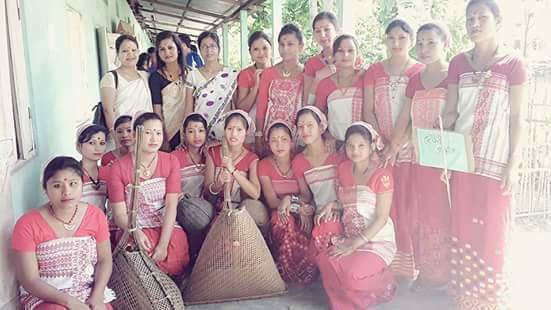(Written by Prerna Patel)
Chutia Tribe
Chutia is one of the oldest ethnic groups of Assam. They have originated from present-day south China but presently residing in upper Assam.

The word Chutia can also be spelled as sutiya, chutiya, or sutia. However, there are many different opinions among scholars regarding the meaning of the word chutia. Deodhai buranji mentions chutias as chutikas. Buranjis are the historical chronicles and manuscripts written initially in the Ahom language and later in the Assamese language. According to deodhai buranji, the word chutia has been shortened over time from the word chutika. In deori-chutia language, Chu has two meanings pig and pure, on the other hand, tika means lineage or origin. And according to Indian mythology, the pig is related to Varaha, one of the ten avatars (incarnation) of the lord Vishnu . So this links chutika to Varaha lineage or Varaha origine. On the other hand, writers like Bishnuprasad Rabha, W. B. Brown, and Paban Chandra who wrote the book “the Debongiyas” believe that the word chutiya means “ the natives who live near pure water”. They said that the word ch-ti-ya has been derived from deori-chutia language. In which, chu means pure, ti means water and ya means natives of the land.
 But whatever be the origin of the word chutia; the origin, history, and culture of this tribe are very interesting.
But whatever be the origin of the word chutia; the origin, history, and culture of this tribe are very interesting.
There are many folklores regarding their origin. The story written in deodhai buranji is widely accepted. According to deodhai buranji, Birpal, descendent of Bhirmukka, had settled down with 60 chutia families on a hill named Swarngiri/Sonagiri in 1189 CE and with the time they spread in nearby areas and Birpal became their lord.
The history of Chutia dynasty goes back to 1187 CE when chutia the kingdom established in eastern Assam on the northern bank of the river Brahmaputra. The kingdom absorbed the ancient Pal dynasty and reigned for over 400 years in northeast Assam and Arunachal Pradesh with their capital Sadiya on the bank of river Brahmaputra. In the late 17th century CE, chutia dynasty declined and gave way to the Ahom dynasty.
Chutias was the first dynasty to use gunpowder in the northeast. They used gunpowder in handguns called Hiloi and in big canons called Bor- Top in deori-chutia language. When Mir Jumla, a subedar of Bengal under the Mughal emperor Aurangzeb, visited their kingdom, on returning he brought 675 big cannons and 4750 mounds of gun powder because the gunpowder of chutias was of much more good quality than what they had.
Presently, they are recognized as Other backward classes (OBCs) by the government of India.
About their religion, we have come to know that chutia follows the Ekasarana religion. Which is a pantheistic religion which was founded by Srimana Sankardev in 15th century CE in Assam. The spread of vaishnavite religion brought some reforms like restrictions on the use of meat and alcohol in their rites in a section of chutias who came to be known as Kesa – ponthis and the other who have retained the age-old customs in its original form are termed as Poka- Ponthis.
Chutias perform many rituals and celebrated many festivals like Deo-Kuber ritual in which earthen lamps are lighted in the name of God of wealth Kuber as well as Kundi (shiva). Another ritual called Dangoria Sabah. Dangoria is supposed to be the village deity among the chutias. According to ancient beliefs, his spirit lives in the largest tree of the village and he protects the villagers from all troubles. It is believed that he roams around the village in the night holding the Dang (stick). His spirit warns the people who are supposed to face trouble in the upcoming days by hitting the doors with the stick. Then the householder organize the Dangoria ritual which is also known as 'Rangoson' in deori-chutia language. Along with these, other rituals like Apeswari Sabah and Suvasani are also celebrated by chutia community.
They also have their tribal dance called 'Panitola' dance which they perform on various occasions.
Nowadays, chutia people face a lot of problems as they use the word chutia as their surnames. Chutia is an offensive slang word in the Hindi language. When they try to register themselves on online portals for jobs or for admission in educational institutions, the portals keep rejecting their surname and keep saying to use 'proper naming' words.